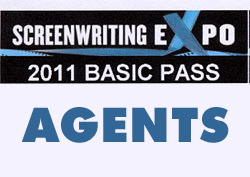 Agents
Agents
Another post in the continuing saga of my experiences at the Screenwriting Expo this past weekend…
Today I’m excited to relay some excellent advice and industry insight from some Agents whose sessions I attended:
- Victoria Wisdom, former partner at BWK
- Emile Gladstone, ICM
- Bob Hohman, Gersh
Just like my friend Michele Wallerstein, the first thing you notice about a successful Agent is that they’re all extremely high functioning and assertive. If you ever have an opportunity to meet with an Agent, make sure you’ve had a full night’s sleep, a double shot of Espresso, and are firing on all cylinders… or you simply won’t be able to keep up.
Wisdom (her real name), has a commanding presence that makes you sit up and pay attention.
Gladstone looks like Peter Parker, has an I.Q. that’s obviously north of 140, and is probably Kaiser Soze.
Hohman (the least intimidating of the bunch), made a joke in passing about his being a savant. (He probably wasn’t joking.)
After searching for some web links, I found Wisdom’s web site. I also found a great article/interview by Jim Cirile (who hosted one of the panel discussions) that features Gladstone. Be sure to read through these two sources for some of the same tips that were offered during their Screenwriting Expo sessions.
And now, without further ado, I present…
The Top 20 Agents Tips
Note: The following insights are my interpretations of what the Agents said. Any errors or omissions are purely my own.
Victoria Wisdom:
- The commercial market for films is about 70% overseas, and 30% for U.S. and Canada. That means you need to think about whether or not your movie will “travel well” — because the ones that do are the most likely to get made. Get global; write a story that’s universally understood.
- It’s dangerous to follow trends as a benchmark for deciding what movie to write next. However, if you’re trying to sell a script, it pays to reference current script sales and how they are relevant to your movie.
- Pitch the concept, not the plot. Pitch the concept in such a way that the story sells itself. Hollywood is very template-based. That’s why coming up with a concept that’s the “same, but different” is so important; something that can be summarized in a quick pithy line that Producers/Execs can understand. For example, the quick sell for The Bourne Identity is: “James Bond with amnesia.” Source Code is: “Groundhog Day with a sci-fi twist.”
- Do your homework on three things: 1) What are studios buying? 2) What are they making? 3) What was successful?
Emile Gladstone:
- Packaging (attaching an actor or director to your movie) is good for getting a movie sold, but not necessarily for getting a movie made.
- Often you’ll have to do multiple drafts of a script, simply to appease the Actors, Producers, Directors, Executives, etc…. knowing full well that some of these drafts will never see the light of day.
- If you’re a writer that wants any semblance of control, you should write a TV pilot. In TV, writers are the “directors” (i.e. they have the creative control). Film, is a director’s medium.
- If you want to sell a script, figure out which production companies are making the movies that are most like yours, then get in touch with the lowest Creative Executive on the totem pole, and try to get them to read it.
- Best selling scripts: Tentpole, High Concept, Genre-bending
- These days Hollywood uses a “P & L” (Profit and Loss) risk assessment to determine whether or not a movie can be made. He cited an example of a movie that the studio wants to make, has an A-list actor attached, but that they can’t get made because it doesn’t satisfy the risk profile.
Bob Hohman:
- The number one job of an Agent is to explain showbusiness to the client. (i.e. What Hollywood is buying, what just sold two weeks ago that’s exactly the same concept as yours, why you shouldn’t write that period piece, etc.)
- You need more than one script to show that you’re a writer.
- You’re in the business of making things up. Don’t write strictly personal stories that are only powerful because they happened to you.
- Don’t write your script alone and think you’re done. Generate fans of your work. Managers, Producers — they are all friends to help you write your screenplay and get it sold.
- TV is more concerned about a compelling idea than a script. Often networks won’t even read a script before they start developing. TV loves development (opposite of movies).
- For writing assignments, there’s no work in the middle pay bracket right now. So A-List writers are working and C-List writers are working.
- Aspiring screenwriters should have jobs with zero responsibility, while they’re trying to establish themselves. Save your brainpower for your screenplay.
- Always exceed expectations (e.g. If you’re given 10 days for a rewrite, get it done in 8).
- Unlike film, Cable channels will buy a pitch from someone who’s not famous. They’ll just pair them with an established showrunner.
- Most of his clientele who are making money are in their 50’s. Alvin Sargent is 83 years old and gainfully employed. It may be a youth-driven industry, but really it’s all about your energy.
Did you attend any of the Agent sessions? What was the best advice you heard?
Tomorrow’s Edition: Pitching Advice and Horror Stories…
Previous Screenwriting Expo 2011 Posts:





Didn’t get to attend this one. Thanks for the recap.
My pleasure Vic.
I am an ex-model and actress. These agents are needed but in reality, they got *** taste in films. Most are into soft films and scripts. Those you find on the Black List:which is a joke IMO.
Films are controlled by the director and writer and producer.
Agents? they got *** idea WHAT cinema is about.
With the internet revolution, who needs them. Just get a good script and a director and entertainment lawyer on board, then you are cooking. And he producer, and agents could go pick his/her nose. Wasting my time writing this btw.
Lucy and Veena
“Lucy H”? “Chere”? Honestly, I can’t tell whether you’re deliberately trolling, or just have a profound ignorance of the way movies and screenwriting careers are made.
One thing’s for sure, you’re very bitter and have difficulty posting coherent sentences… which I guess is why the Hollywood angle hasn’t been working out for you.
Trevor: Your articles on the Screenwriting Expo are wonderful. They information that you are sharing is very important and right on the money. I hope the writers are paying close attention to your observations, they will certainly benefit from it! All the best, Michele
Thanks for the feedback Michele! Coming from a respected former literary agent like yourself, that’s a huge compliment. Much appreciated. Hope you’re having a great December!
Trevor
Adolph Mondry MD
753 Virginia Street
Plymouth, Michigan 48170
734-459-6267
ajmondry@yahoo.com
DearSir: 12-6-13
I would like you to review “Highly Connected (to a Zombie Too)”, a screenplay answering the question – what would you do if you discovered that you controlled subconsciously, then esoterically, a universe where zombies roamed free? It was once represented by Jack Scagnetti.
I published two editorials on high level esoteric scams. I wrote a hundred and fourteen page textbook on esoteric medical rip-offs, a two hundred and thirty page poem and fictional account of life from an esoteric point of view, and a five hundred page novel examining esoteric power and control along with its consequences throughout history (especially in the Middle East). I used all of this experience to craft this masterpiece along with our kids’ obsession with zombies.
Supernatural control in the screenplay is catchy like an infection and reflects the subconscious of the connected person – villain as well as hero. An antidote is discovered, which disconnects control, but until the connection (a previously unknown new technology – a six lead transistor in this case) is discovered and destroyed, the screenplay twists and turns around good and evil through an optional number of computer generated special effects featuring a feeble reactive military intervention; controlled meteorite trajectory guidance and other controlled natural weaponry; and, a chilling example of a connected monster – half zombie and half evil fiend – delivering lethal lightning bursts from its finger tips as it pursues our hero, until comedy and love save the day. By the way the special effects can be realized quite inexpensively and even deleted for a TV show or stage play or added for a competitive lion’s share of a summer time market without detracting from the story. In any event plenty of latitude exists in the story to completely penetrate any desired market. The zombies could disappear as well, but the kids might too. So the zombies stick around until the bitter end or do they? Wait until you hear what does happen to them. It’ll keep the kids in their seats, except for the ones who soiled them or split – too scared to stick around.
I am a physician and a self- taught mathematician, physicist, and engineer. I own a software company. I am an energy and medical advisor to the White House.
Yours truly,
Adolph Mondry MD
Hi Adolph,
Your screenplay sounds… esoteric. It might be worthwhile reviewing the first page or two on my blog. Let me know if you’re up for it.
Cheers,
Trevor